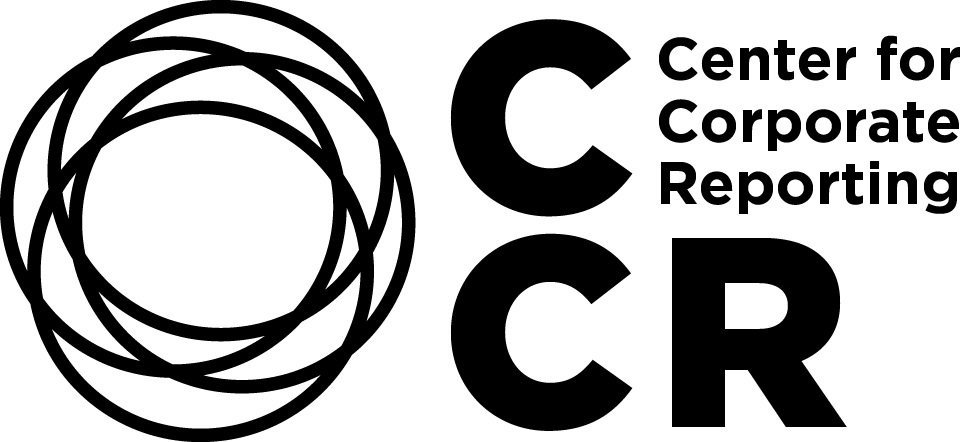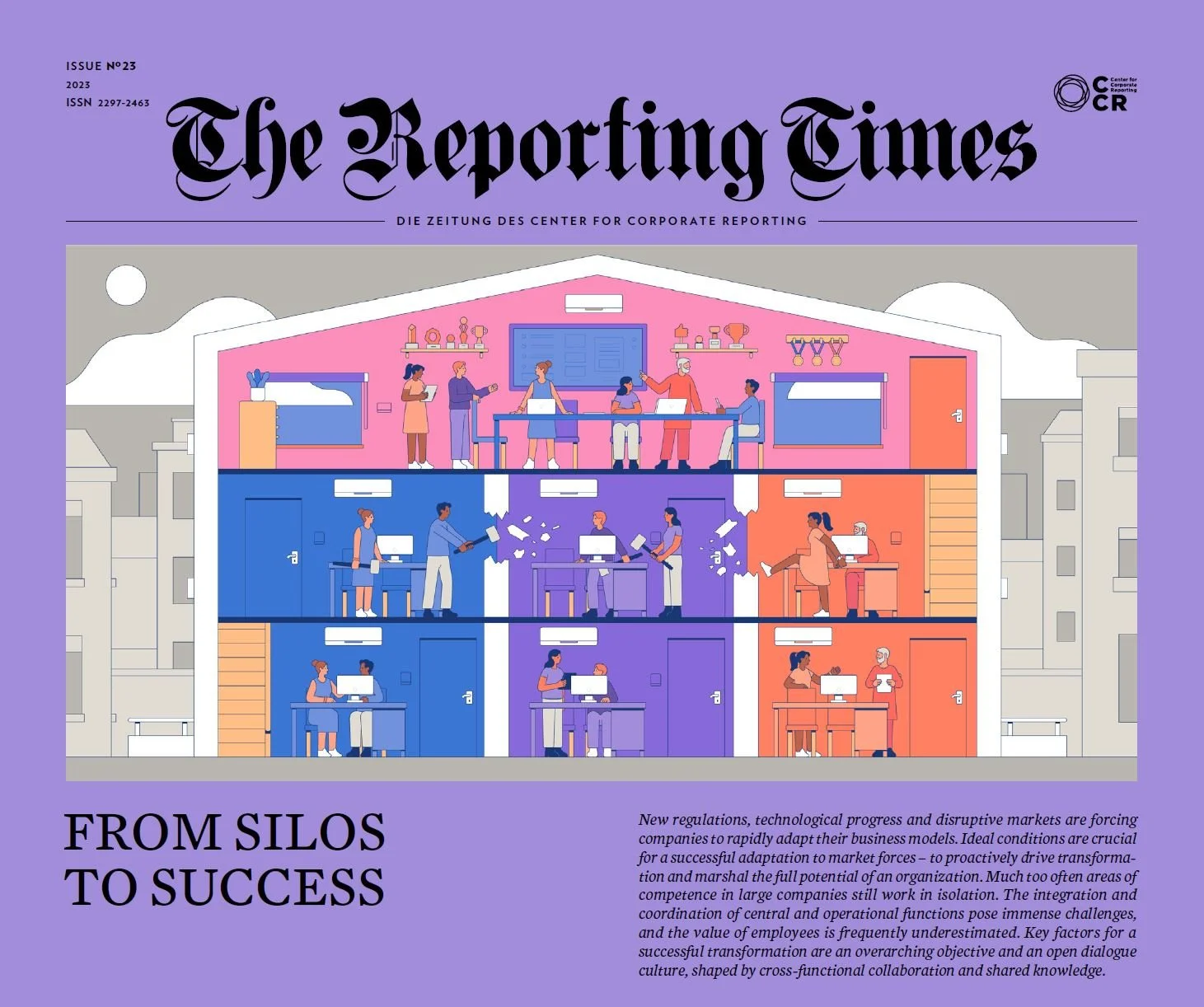The regulator only intervenes when voluntary initiatives fail. Since many companies have only made modest progress to date in transforming their business models, new waves of regulation have emerged. When compliance is regarded merely as a tick-the-box exercise, this great effort is wasted. Stakeholder requirements already go far beyond the legal minimum in many areas. Companies should see this transformation as an opportunity to align strategy, business model and governance, in order to gain a competitive advantage and sustain long-term success.
Einstieg | Lead & Editorial | Issue No. 24
Einstieg | Inserenten | Issue No. 24
Interview | «Transparency serves as a unifying factor for our employees»
By Thomas Scheiwiller with Maria Paola Chiesi
Before Maria Paola Chiesi took over her current role as Vice Chair of the Board of Directors of the internationally operating Chiesi Group, she spent nine years as Head of Shared Value & Sustainablility at Chiesi Farmaceutici, where she was responsible for monitoring and measuring the Group's environmental and social impact. Inspired by this experience, she initiated the process of transforming Chiesi into a Benefit Corporation, which strengthened the company’s position by obtaining the B Corp certification.
Nachhaltige Kommunikation – Stakeholder Engagement als Erfolgsfaktor in turbulenten Zeiten
Von Christof Ehrhart
Die Frage der zielführenden Kommunikation von Nachhaltigkeit ist in aller Munde. Dabei geht es nicht nur um die Erfüllung umfassender rechtlich bindender Berichterstattungsstandards, die – wie etwa im Falle der Europäischen Nachhaltigkeitsrichtlinie (CSRD), der Europäischen Lieferketten-Richtlinie (CSDDD) oder dem Lieferkettensorgfaltspflichtengesetz der Bundesrepublik Deutschland – den Unternehmen hohe Transparenzvorgaben machen. Vielmehr dreht sich die Debatte im Kern um die Akzeptanz unternehmerischen Handelns angesichts deutlich gestiegener gesellschaftlicher Legitimitätserwartungen.
Sustainability and profitability: a new mindset for the future
By René Schmidpeter
In today’s world, companies and societies face the challenge of establishing sustainable practices without neglecting economic profitability. Traditionally, sustainability has often been seen as the antithesis of profitability, but more and more voices are calling for a paradigm shift that combines both aspects. This text examines how a new mindset that integrates sustainability and profitability can be developed and what steps are needed to achieve this goal.
Beyond Compliance: Inspiration als Katalysator einer nachhaltigen Zukunft
Von Michèle F. Sutter-Rüdisser und Patrick Zbinden
Der kürzlich auf Planet Erde gelandete «Alien» dürfte mit grossem Erstaunen auf die geschäftigen Menschen und ihr Zusammenspiel mit ihren komplexen Schöpfungen – den Unternehmen – blicken. Eine gewisse Absurdität im System wird ihm dabei wohl nicht entgehen: Um die Unternehmen zu lenken, hat der Mensch Regulierungen geschaffen, deren Komplexitätsgrad derart hoch sind, dass nur eine Heerschar von spezialisierten Expertinnen und Experten sie umfassend begreifen, implementieren und überwachen kann.
Mit Daten und IT bessere Entscheide für die Nachhaltigkeit treffen
Sustainability Reporting macht Erfolge messbar und sichtbar
Von Nicola Kimm
Als Unternehmen in einem sogenannten «Hard-to-abate»-Sektor steht Heidelberg Materials auf dem Weg zu Netto-Null vor einer besonderen Herausforderung: eine Lösung für die bisher unvermeidbaren Prozessemissionen aus der Zementproduktion finden. Unser Geschäft zu transformieren und einen Beitrag zur Bewältigung globaler Herausforderungen zu leisten – zu denen neben dem Klimawandel auch Ressourcenknappheit und der Verlust der Artenvielfalt gehören –, ist daher eine wesentliche Aufgabe.
Deep Work statt Dauerstress
Point of View | Beyond regulated supply - Intelligent demand
Interview | “We act proactively and consider broader strategic implications to create value for all our stakeholders”
By Barbara Zäch with Birgit Conix
Sonova envisions a world where everyone enjoys the delight of hearing and therefore lives a life without limitations. It is a global leader in innovative hearing care solutions: from personal audio devices and wireless communication systems to audiological care services, hearing aids and cochlear implants. The Group was founded in 1947 and nowadays serves an ever growing consumer base in more than 100 countries.
CCR Marketplace | 15 years of trendsetting and peer-to-peer learning
By Center for Corporate Reporting
For 15 years, our annual Geschäftsberichte-Symposium (GBS) has been recognized as a platform for sharing knowledge and networking in the corporate reporting community. It attracts more than 300 decision-makers, experts and practitioners every year to engage in lively debates, learn how they can increase the quality of their reporting and get inspired by the latest knowhow and best practice in corporate reporting. Over the past 15 years, we have not only continuously developed the GBS but have also built a community of over 80 members who regularly meet at member-only events, benefit from peer-to-peer learning, exclusive publications and tailored consulting services.
7 Antworten von
Rethinking capitalism: paving the way for sustainable transformation
By Peter Bakker
It’s time to take a hard look at the way our economic system is currently wired and impacting our society. Our current model of capitalism is not sustainable and is contributing to environmental destruction and social inequality. But there is hope. By rethinking capitalism, we can pave the way for a more sustainable future – a world where 9+ billion people live well within planetary boundaries.
The Good, the Bad and the (tremendously) Ugly: AI and the quest for better reporting
By Claire Bodanis
Last week, one of my US reporting pals alerted me to a survey by Workiva, which found that “83% of [US] executives… say their company uses generative AI to augment business reporting staff” and “89% say their company will likely do so in the next five years”. I find these statistics fascinating, because either the US is miles ahead of the UK in using AI in its reporting, or I’ve been phrasing my own questions to UK reporters somewhat differently.
How AI images will revolutionize branding and corporate reporting
By Kai Rolker
Many companies are currently discussing the impact of generative artificial intelligence (AI) on corporate communications. In particular, the creation of images using AI is experiencing a rapid upswing. But what exact impact will this technology have on branding and reporting? A pilot project at Clariant sheds light on this question.
Sprachkolumne | Geschäftsberichte ganz einfach: 4 Schritte, wie es wirklich gelingt
Von Fabian Dieziger
Eine immer breitere Adressatengruppe und extern getriebene Veränderungen im Reporting machen klar: Wer das Datendickicht durchdringen und Stakeholder überzeugen will, muss verständlich kommunizieren. Corporate Publisher stehen in der Pflicht: Wie sorgt man für Reportingtexte, die ohne Umwege ankommen? Zum Beispiel mit dem neuen internationalen Standard für Einfache Sprache.
Wenn Transparenz zur Action führt
Von Reto Ringger
Das Thema ESG oder nachhaltige Anlagen hat in seinem jungen Dasein schon zahlreiche Phasen durchlaufen. Vom «Non-Event» in den 90er-Jahren zu «Nischenthema» in den 2000er-Jahren zu «Wir sind als Anbieter führend in diesem Thema» in den letzten 5–10 Jahren zu aktuell «Wir raten eher davon ab» hat dieses Thema schon alle Facetten der Haltung der verschiedenen Anbieter kennengelernt.
How interoperability reduces the reporting burden
By Peter Paul van de Wijs
Over the last few years, we have seen a significantly growing demand for transparent information on companies’ impacts. Policy-makers and capital market regulators are addressing this call for information by increasingly mandating corporate sustainability reporting and transparency. Today there are at least 542 policies around the world in 132 countries which mandate companies to report their sustainability impacts.
Erstes Jahr nichtfinanzielles Reporting gemäss OR – und jetzt?
Von Bernd Kasemir, Daniel Lucien Bühr und Martin Eckert
Die Nervosität der Unternehmen war im Vorfeld der neuen OR-Bestimmungen deutlich spürbar. Viele Unternehmen fanden es schwierig, entsprechend den gesetzlichen Vorgaben über die Risiken ihrer Geschäftstätigkeit zu berichten, anstatt lediglich positive, imagefördernde Massnahmen und Erfolge im Bereich der Nachhaltigkeit hervorzuheben. Nach der Publikation der Berichte über das abgelaufene Geschäftsjahr halten sich daher oft die Erleichterung, die Berichterstattung (erfolgreich) abgeschlossen zu haben, und die Unsicherheit, wie man es beim nächsten Mal ruhiger und mit einem verlässlich korrekten Ergebnis machen kann, die Waage. Zusammen mit unseren Kunden und Mandanten haben wir einige Hinweise herausdestilliert, um für die Zukunft besser gewappnet zu sein.
What keeps ESG investors awake at night?
Nachhaltigkeitsaspekte als integraler Bestandteil der Darstellung der Unternehmenslage
Von Georg Lanfermann
Mit der Umsetzung der europäischen Corporate Sustainability Reporting Directive (CSRD) wird eine neue Ära der Unternehmensberichterstattung eingeläutet. Mit der nunmehr erforderlichen Verortung im Lagebericht wird eine umfassende Nachhaltigkeitsberichterstattung ein elementares Element der Darstellung der Lage des Unternehmens. Dies birgt für berichtspflichtige Unternehmen auch die Chance, ein einheitliches Storytelling voranzubringen, das Aspekte der Finanz- und Nachhaltigkeitsberichterstattung vereint. Der deutsche Rechnungslegungsstandardsetzer DRSC stellt diesen Aspekt des einheitlichen Storytellings bei der gegenwärtig stattfindenden Überarbeitung des DRS 20 zur Lageberichterstattung in den Vordergrund.
Clearly communicating the Sandoz story and investment case
By Steffen Kurzawa
At Sandoz, we spent much of 2023 explaining to investors, media and other stakeholders how a standalone company would drive shareholder returns and create value. Those efforts came together on October 4, 2023, when we were listed as an independent company on the SIX Swiss Exchange. We used our first annual report, published in March 2024, as a platform to underline and expand on those points in a clear and engaging format.
Auf ein Wort mit...
Komplette Ausgabe | Issue No. 23 | From Silos to Success
New regulations, technological progress and disruptive markets are forcing companies to rapidly adapt their business models. Ideal conditions are crucial for a successful adaptation to market forces – to proactively drive transformation and marshal the full potential of an organization. Much too often areas of competence in large companies still work in isolation. The integration and coordination of central and operational functions pose immense challenges, and the value of employees is frequently underestimated. Key factors for a successful transformation are an overarching objective and an open dialogue culture, shaped by cross-functional collaboration and shared knowledge.
Einstieg | Lead & Editorial | Issue No. 23
Einstieg | Inserenten | Issue No. 23
Interview | «We make sure that we step up our pace and not relax, simply because we cannot afford it»
By Tjeerd Krumpelman with Solange Rouschop
As Chief Sustainability Officer at ABN AMRO, Solange Rouschop focuses on finding business opportunities that contribute to sustainable top-line growth and building an integrated sustainability model to create impact for the bank and for its stakeholders. What are her aspirations? How important is integrated thinking? And how supportive can reporting be, in Solange’s opinion?
Shared Leadership - Geteilte Verantwortung durch moderne Führung
Von Heike Bruch und Lena Rudolf
Die Arbeitswelt unterliegt tiefgreifenden Veränderungen, angetrieben von Megatrends wie Digitalisierung, Arbeitskräftemangel und Nachhaltigkeit, die Innovation auch in der Art der Zusammenarbeit erfordern. Um dies zu meistern, stehen Unternehmen vor der Herausforderung, sich in Richtung einer Netzwerkorganisation zu wandeln. Dabei erfordern Trends wie der Abbau von Hierarchien, die Förderung von Selbstorganisation und Verantwortungsübernahme ein Umdenken bezüglich der Führung.
Transforming Organizations Through Enhanced Corporate Reporting
By Sallie Pilot
In the dynamic landscape of modern business, addressing pressing challenges like climate change, biodiversity loss and equitable transitions demands a fundamental shift in societal mindsets and corporate conduct. Businesses, regardless of size or ownership, wield substantial influence over the world’s fabric – from individuals to environments – through their offerings, operations and ecological impact.
It Smells Like Team Spirit
Dufry’s Travel Experience Revolution takes off
By Maurus Lienhard and Philipp Haumüller
In early July 2022, Dufry, the global travel retail player, announced a business combination with Autogrill, a global travel food & beverage (F&B) operator. The ambition of the business combination is to have a lasting impact on the travel retail & F&B industry by refining the experience for travellers, and create revenue and cost synergies for the newly combined Group. For a successful combination, announcing the leadership representatives of both companies as well as creating a “One Team/One Company” spirit were key first steps of the integration process.
Vom Silodenken zum integrierten Reporting
Von Katharina Kukiolka, Andrea Lingk und Christoph Schmidt
Die ETH Zürich ist eine der führenden technischen Hochschulen der Welt. Sie ist dezentral organisiert und möchte die Vielfalt in der Einheit bewahren. Davon geprägt war auch die Weiterentwicklung der Berichterstattung. Sie war von der Evaluation bis zur Produktion breit abgestützt, was sich schon im Projektverlauf als entscheidender Erfolgsfaktor herausstellte. Das Ergebnis: ein integriertes, strategisches und digital getriebenes Reporting.
Grün und glaubwürdig: Stolperfalle Greenwashing im Transformationsprozess
Von Ina Walthert
Nachhaltigkeit ist im Kerngeschäft von Unternehmen angekommen. Die Herausforderung besteht darin, den rege verwendeten Begriff mit Taten zu belegen. Unternehmen sind gefordert, die Schaffung von ökologischem und sozialem Mehrwert konsequent in die eigene Value Proposition zu integrieren. Echte Produktinnovation, Transformationsbereitschaft und eine gelungene Kommunikation sind die Essentials für ein glaubwürdiges (Nachhaltigkeits-)Image. Die AMAG Gruppe entwickelt nachhaltige Mobilitätslösungen. Eine herausfordernde Aufgabe auch für die Nachhaltigkeitskommunikation.
Nature's risk is everyone's business
Meeting Extensive Sustainability Requirements with an Effective Strategy
By Marco Märsmann and Alexandra Sauer
Over the last 15 years, Bell Food Group has evolved from a Swiss meat producer into a leading European food company. This brings increasing responsibility and leverage to drive the food system in a more sustainable direction. In addition, the company is subject to CSRD, VSOTR, OR 964, LKSG, SBTi and OECD, amongst others, each of which is backed by a system of disclosure requirements and governance guidance. How to react to this complex situation without losing sight of the own strategic goals?
Interview | Zusammenarbeit als Erfolgsfaktor
Von Barbara Zäch mit Manuela Suter
Bucher Industries entwickelt und produziert Landmaschinen, Kommunalfahrzeuge, hydraulische Komponenten und elektrohydraulische Systeme, Produktionsanlagen für die Glasbehälterindustrie, Anlagen für die Herstellung von Getränken sowie Automatisierungslösungen. Der Konzern steht für Maschinen, Anlagen und Komponenten, die technologisch, wirtschaftlich und ökologisch überzeugen und sich auf die grundlegenden Bedürfnisse der Menschen ausrichten.
The Paradox of Transparency - Geschäftsberichte-Symposium 2023
By Michael Düringer
The 14th Geschäftsberichte-Symposium took place on Wednesday, June 14, 2023 at the Gottlieb Duttweiler Institute (GDI) in Rüschlikon. The Symposium’s timely focus on the latest regulatory requirements in sustainability reporting, along with top-notch keynote speakers, drew a record number of participants. Around 250 guests were on site, while a further 100 attendees joined online via livestream to learn about the latest developments and trends in corporate reporting.







































